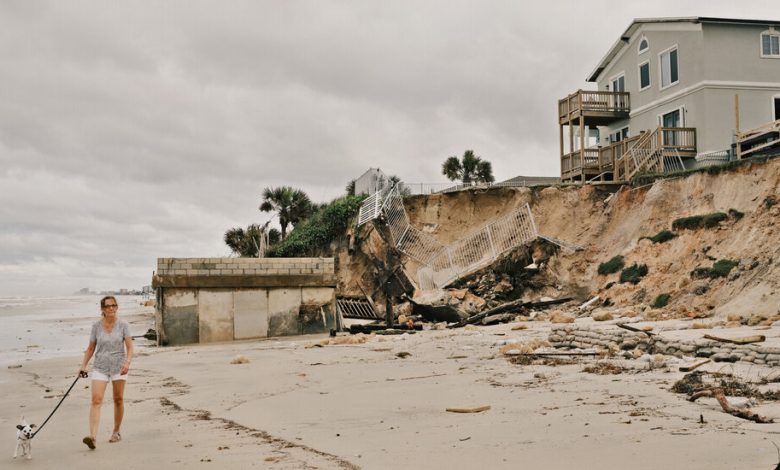White House Aims to Reflect the Environment in Economic Data

Forests that keep hillsides from eroding and clean the air. Wetlands that protect coastal real estate from storm surges. Rivers and deep snows that attract tourists and create jobs in rural areas. All of those are natural assets of perhaps obvious value — but none are accounted for by traditional measurements of economic activity.
On Thursday, the Biden administration unveiled an effort to change that by creating a system for assessing the worth of healthy ecosystems to humanity. The results could inform governmental decisions like which industries to support, which natural resources to preserve and which regulations to pass.
The administration’s special envoy for climate change, John Kerry, announced the plan in a speech at the World Economic Forum, the annual gathering of political and business leaders in Davos, Switzerland. “With this plan, the U.S. will put nature on the national balance sheet,” he said.
The initiative will require the help of many corners of the executive branch to integrate the new methods into policy. The private sector is likely to take note as well, given rising awareness that extreme weather can wreak havoc on assets — and demand investment in renewable energy and sustainable agriculture.
In the past, such undertakings have been politically contentious, as conservatives and industry groups have fought data collection that they saw as an impetus to regulation.
A White House report said the effort would take about 15 years. When the standards are fully developed and phased in, researchers will still be able to use gross domestic product as currently defined — but they will also have expanded statistics that take into account a broader sweep of nature’s economic contribution, both tangible and intangible.
Those statistics will help more accurately measure the impact of a hurricane, for example. As currently measured, a huge storm can propel economic growth, even though it leaves behind muddied rivers and denuded coastlines — diminishing resources for fishing, transportation, tourism and other economic uses.
“You can look at the TV and know that we’ve lost beaches, we’ve lost lots of stuff that we really care about, that makes our lives better,” said Eli Fenichel, an assistant director at the White House Office of Science and Technology Policy. “And you get an economist to go on and say, ‘G.D.P.’s going to go up this quarter because we’re going to spend a lot of money rebuilding.’ Being able to have these kinds of data about our natural assets, we can say, ‘That’s nice, but we’ve also lost here, so let’s have a more informed conversation going forward.’”
Taking nature into economic calculations, known as natural capital accounting, is not a new concept. As early as the 1910s, economists began to think about how to put a number on the contribution of biodiversity, or the damage of air pollution. Prototype statistics emerged in the 1970s, and in 1994, the Commerce Department’s Bureau of Economic Analysis proposed a way to augment its accounting tools with measures of environmental health and output.
But Congress ordered the bureau to halt its efforts until an independent review could be completed. States whose economies depend on drilling, mining and other forms of natural resource extraction were particularly worried that the data could be used for more stringent regulation.
“They thought that anything that measured the question of productivity of natural resources was inherently an environmental trick,” a Commerce Department official said afterward.
Five years later, that independent review was completed in a report for the National Academy of Sciences. The academy panel — led by the Yale economist William Nordhaus, who went on to win the Nobel Prize for his work on the economic impact of climate change — said the bureau should continue.
“Natural resources such as petroleum, minerals, clean water and fertile soils are assets of the economy in much the same way as are computers, homes and trucks,” the report read. “An important part of the economic picture is therefore missing if natural assets are omitted in creating the national balance sheet.”
While the United States lagged, other countries moved ahead with incorporating nature into their core accounting. The United Nations developed a framework for doing so over the last decade that supported decisions such as assessing the impact of shrinking peat land and protecting an endangered species of tree. Britain has been publishing environmental-economic statistics for several years as well. International groups like the Network for Greening the Financial System, which includes most of the world’s central banks, use some of these techniques for assessing systemic risk in the financial system.
Skepticism about including environmental considerations in economic and financial decision-making remains in the United States, where conservatives have disparaged investing guidelines that put a priority on a company’s performance along environmental, social and governance lines. The social cost of carbon, another measurement tool for assessing the economic impact of regulations through their effect on carbon emissions, was set close to zero during the Trump administration and has been increased significantly under President Biden.
Understand Inflation and How It Affects You
- Federal Reserve: Federal Reserve officials kicked off 2023 by grappling with a thorny question: How should central bankers understand inflation after 18 months of repeatedly misjudging it?
- Social Security: The cost-of-living adjustment, which helps the benefit keep pace with inflation, is set for 8.7 percent in 2023. Here is what that means.
- Tax Rates: The I.R.S. has made inflation adjustments for 2023, which could push many people into a lower tax bracket and reduce tax bills.
- Your Paycheck: Inflation is taking a bigger and bigger bite out of your wallet. Now, it’s going to affect the size of your paycheck in 2023.
Benjamin Zycher, a senior fellow at the right-leaning American Enterprise Institute, expressed concern Thursday that the new approach would introduce a degree of subjectivity.
“I think there’s a real danger that if in fact they’re trying to put environmental quality values into the national accounts, there’s no straightforward way to do that, and it’s impossible that it wouldn’t be politicized,” Dr. Zycher said in an interview. “That’s going to be a process deeply fraught with problems and dubious interpretations.”
Few economic statistics are a perfect representation of reality, however, and all of them have to be refined to make sure they are consistent and comparable over time. Measuring the value of nature is inherently tricky, since there is often no market price to consult, but other sources of information can be equally illuminating. The Bureau of Economic Analysis has undertaken other efforts to measure the value of services that are never sold, like household labor.
“That’s exactly why we need this sort of strategy,” said Nathaniel Keohane, president of the Center for Climate and Energy Solutions, a research and advocacy group. “To really develop the data we need so that it’s not subjective, and make sure we are really devoting the same quality control and focus on integrity that we do to other areas of economic statistics.”
The strategy does not pretend to cover every aspect of nature’s value, or solve problems of environmental justice simply by more fully incorporating nature’s contribution, particularly for Indigenous communities. Those concerns, said Rachelle Gould, an associate professor of environmental studies at the University of Vermont, will need to be prioritized separately.
“There are a lot of other ways nature matters that can’t be accounted for in monetary terms,” Dr. Gould said. “It’s appropriately cautious about what might be possible.”



